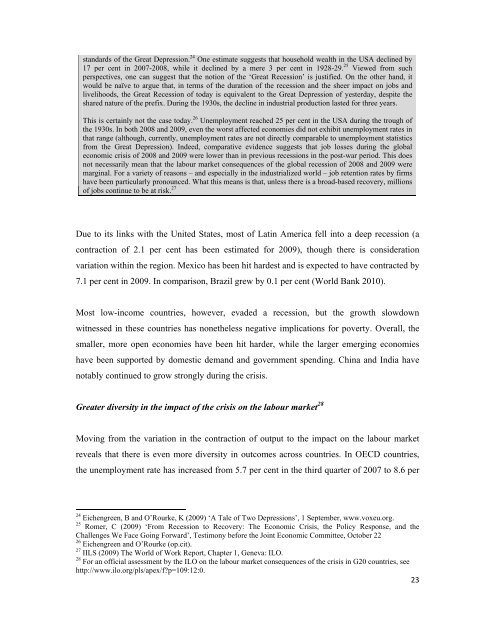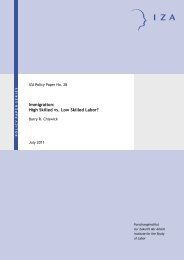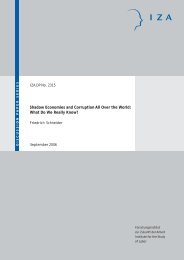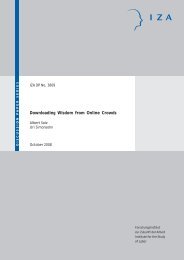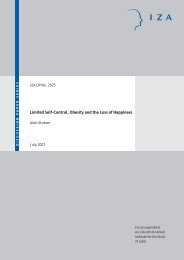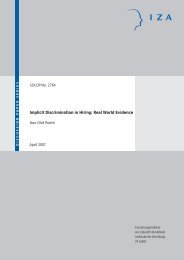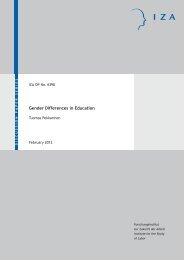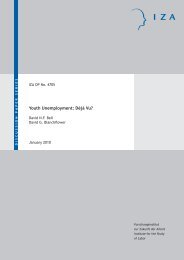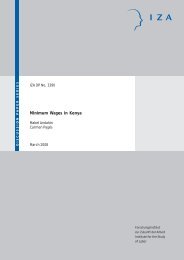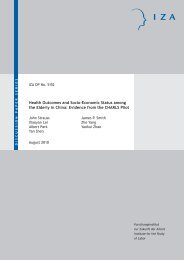The Great Recession of 2008-2009: Causes ... - Index of - IZA
The Great Recession of 2008-2009: Causes ... - Index of - IZA
The Great Recession of 2008-2009: Causes ... - Index of - IZA
- TAGS
- recession
- index
- ftp.iza.org
You also want an ePaper? Increase the reach of your titles
YUMPU automatically turns print PDFs into web optimized ePapers that Google loves.
standards <strong>of</strong> the <strong>Great</strong> Depression. 24 One estimate suggests that household wealth in the USA declined by<br />
17 per cent in 2007-<strong>2008</strong>, while it declined by a mere 3 per cent in 1928-29. 25 Viewed from such<br />
perspectives, one can suggest that the notion <strong>of</strong> the ‘<strong>Great</strong> <strong>Recession</strong>’ is justified. On the other hand, it<br />
would be naïve to argue that, in terms <strong>of</strong> the duration <strong>of</strong> the recession and the sheer impact on jobs and<br />
livelihoods, the <strong>Great</strong> <strong>Recession</strong> <strong>of</strong> today is equivalent to the <strong>Great</strong> Depression <strong>of</strong> yesterday, despite the<br />
shared nature <strong>of</strong> the prefix. During the 1930s, the decline in industrial production lasted for three years.<br />
This is certainly not the case today. 26 Unemployment reached 25 per cent in the USA during the trough <strong>of</strong><br />
the 1930s. In both <strong>2008</strong> and <strong>2009</strong>, even the worst affected economies did not exhibit unemployment rates in<br />
that range (although, currently, unemployment rates are not directly comparable to unemployment statistics<br />
from the <strong>Great</strong> Depression). Indeed, comparative evidence suggests that job losses during the global<br />
economic crisis <strong>of</strong> <strong>2008</strong> and <strong>2009</strong> were lower than in previous recessions in the post-war period. This does<br />
not necessarily mean that the labour market consequences <strong>of</strong> the global recession <strong>of</strong> <strong>2008</strong> and <strong>2009</strong> were<br />
marginal. For a variety <strong>of</strong> reasons – and especially in the industrialized world – job retention rates by firms<br />
have been particularly pronounced. What this means is that, unless there is a broad-based recovery, millions<br />
<strong>of</strong> jobs continue to be at risk. 27<br />
Due to its links with the United States, most <strong>of</strong> Latin America fell into a deep recession (a<br />
contraction <strong>of</strong> 2.1 per cent has been estimated for <strong>2009</strong>), though there is consideration<br />
variation within the region. Mexico has been hit hardest and is expected to have contracted by<br />
7.1 per cent in <strong>2009</strong>. In comparison, Brazil grew by 0.1 per cent (World Bank 2010).<br />
Most low-income countries, however, evaded a recession, but the growth slowdown<br />
witnessed in these countries has nonetheless negative implications for poverty. Overall, the<br />
smaller, more open economies have been hit harder, while the larger emerging economies<br />
have been supported by domestic demand and government spending. China and India have<br />
notably continued to grow strongly during the crisis.<br />
<strong>Great</strong>er diversity in the impact <strong>of</strong> the crisis on the labour market 28<br />
Moving from the variation in the contraction <strong>of</strong> output to the impact on the labour market<br />
reveals that there is even more diversity in outcomes across countries. In OECD countries,<br />
the unemployment rate has increased from 5.7 per cent in the third quarter <strong>of</strong> 2007 to 8.6 per<br />
24<br />
Eichengreen, B and O’Rourke, K (<strong>2009</strong>) ‘A Tale <strong>of</strong> Two Depressions’, 1 September, www.voxeu.org.<br />
25<br />
Romer, C (<strong>2009</strong>) ‘From <strong>Recession</strong> to Recovery: <strong>The</strong> Economic Crisis, the Policy Response, and the<br />
Challenges We Face Going Forward’, Testimony before the Joint Economic Committee, October 22<br />
26<br />
Eichengreen and O’Rourke (op.cit).<br />
27<br />
IILS (<strong>2009</strong>) <strong>The</strong> World <strong>of</strong> Work Report, Chapter 1, Geneva: ILO.<br />
28<br />
For an <strong>of</strong>ficial assessment by the ILO on the labour market consequences <strong>of</strong> the crisis in G20 countries, see<br />
http://www.ilo.org/pls/apex/f?p=109:12:0.<br />
23


